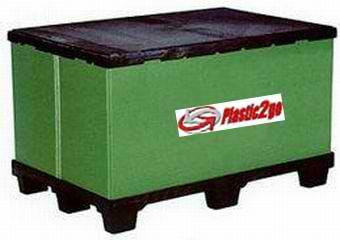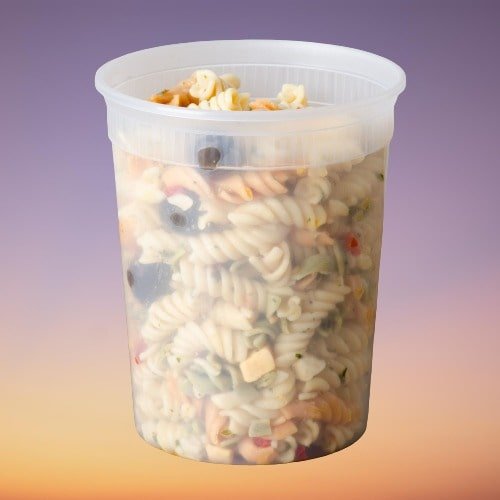The Duty of Mass Plastic Containers in Effective Recycling Practices and Sustainability
Bulk plastic containers are important to contemporary recycling initiatives. Their layout boosts the effectiveness of product collection and transportation, adding to sustainability objectives. These containers not only maximize area however additionally help in keeping track of contamination levels. Their execution is not without obstacles. Understanding the full scope of their influence discloses an intricate relationship between logistics and ecological obligation that warrants more expedition.
Understanding Bulk Plastic Containers
Mass plastic containers function as an essential element in various industries, helping with the storage and transport of products. These containers are generally made from robust products such as high-density polyethylene (HDPE) or polypropylene, which offer durability and resistance to environmental aspects. Their style often consists of features like stackability and modularity, allowing for reliable use of room throughout both storage space and transit.
Industries such as agriculture, food processing, and making often use mass plastic containers because of their light-weight nature and ease of handling. The containers can be found in different sizes and configurations, satisfying the details demands of various items. Their adaptability expands past plain functionality; they can additionally be tailored with covers, deals with, and classifying options to improve usability - bulk plastic containers for sale. Therefore, mass plastic containers play a crucial duty in maximizing logistics and supply chain operations throughout multiple fields, thus adding to general effectiveness and cost-effectiveness
Advantages of Making Use Of Mass Plastic Containers in Recycling
The utilization of mass plastic containers considerably enhances the efficiency of the procedure when companies prioritize recycling initiatives. These containers are made to optimize space, allowing for the storage space and transport of larger amounts of recyclable products. This results in fewer journeys to recycling centers, therefore reducing gas usage and linked emissions.
In addition, mass plastic containers are sturdy and resistant to different ecological variables, making sure that products stay protected during handling and transportation. Their light-weight design additionally adds to decrease transportation prices.
The harmony of these containers helps with better sorting and handling of recyclable products, which can boost general recycling prices. Organizations that adopt bulk plastic containers also demonstrate a dedication to sustainability, positively affecting their brand name picture. Ultimately, these benefits not just simplify reusing techniques however likewise add to broader environmental goals
How Mass Plastic Containers Facilitate Product Collection
Efficient product collection is considerably improved by the use mass plastic containers, as they offer a efficient and organized option for collecting recyclable items. These containers are created to suit large volumes of products, which streamlines the sorting and storage procedure. Their stackable design optimizes room utilization, making it simpler for centers to arrange recyclables without mess.
Additionally, bulk plastic containers are weather-resistant and resilient, enabling for outdoor positioning without degradation. This strength guarantees that products stay secured till they are gathered for processing.

The uniformity in size and shape of these containers facilitates standardization throughout collection factors, enabling far better monitoring of recyclable quantities. Their clear nature permits for easy exposure of components, assisting in the surveillance of contamination levels and guaranteeing that just proper materials are gathered. In general, mass plastic containers play a critical duty in improving the product collection process, thus promoting reliable reusing techniques.
Transport Performance and Environmental Effect
Transportation efficiency plays an essential function in the recycling process, particularly through the optimization of lots capability in bulk plastic containers. By maximizing the quantity of material transported, business can greatly lower the variety of trips called for, thus decreasing their carbon impact. This approach not just improves operational performance however additionally contributes to much more sustainable ecological methods.

Maximizing Load Ability
Optimizing load capability is frequently overlooked, it plays an important duty in boosting transport efficiency and lessening ecological impact in reusing methods. By optimizing the quantity that bulk plastic containers can hold, recycling operations can minimize the number of trips needed for transportation. This not just decreases gas consumption yet likewise lowers the wear and tear on vehicles. Reliable tons administration enables facilities to use room successfully, ensuring that each transport cycle is as productive as feasible. In addition, well-optimized loads can bring about far better negotiations with logistics service providers, possibly decreasing general expenses. Ultimately, boosting load ability contributes to a much more lasting recycling system by cultivating reliable source use and decreasing waste generated throughout transportation.
Decreasing Carbon Footprint
As recycling operations undertaking to minimize their environmental impact, lowering the carbon impact associated with transport arises as an essential goal. Bulk plastic containers play a vital function in attaining this goal by improving lots effectiveness and optimizing logistics. Their lightweight yet long lasting layout permits maximum cargo room usage, lowering the variety of trips required to transport materials. By consolidating shipments, reusing facilities can reduce gas consumption and greenhouse gas discharges. Additionally, tactically locating recycling centers minimizes transportation ranges, furthermore reducing carbon outcomes. In addition, utilizing fuel-efficient cars and alternative power sources improves total sustainability. By incorporating these practices, the reusing sector can considerably lessen its carbon footprint, adding to a more lasting future.
Obstacles in the Use of Bulk Plastic Containers

Contamination Concerns
Contamination problems represent a substantial obstacle in the efficient use of mass plastic containers within reusing methods. These containers often gather residues from previous components, leading to blended products that can impede the recycling process. Contaminants such as food waste, chemicals, or non-recyclable products can endanger the honesty of the whole set, leading to boosted go right here disposal expenses and decreased reusing rates. Furthermore, improper cleansing or sorting can intensify these concerns, making it hard for reusing centers to refine materials efficiently. The presence of contaminants not just influences the high quality of recycled products however also undermines the general sustainability efforts targeted at decreasing plastic waste. Dealing with these contamination obstacles is important for improving the efficiency of bulk plastic container recycling.
Recycling Framework Limitations
Inefficiency in recycling facilities presents substantial difficulties for the effective management of bulk plastic containers. Lots of reusing centers do not have the ability to process big quantities of these containers efficiently, causing increased costs and hold-ups. Poor arranging technologies commonly lead to contamination, as mass containers may be mixed with various other products, complicating the recycling process. Minimal transport choices also hinder the movement of bulk plastic containers to ideal recycling facilities, bring about raised landfill waste. Furthermore, a lack of standardized methods for bulk container reusing produces complication among organizations and consumers, better complicating efforts to advertise sustainability. Resolving these framework limitations is vital to enhance recycling practices and maximize the capacity of bulk plastic containers in a round economic climate.
Finest Practices for Carrying Out Bulk Plastic Containers
They should focus on a strategic strategy that improves performance and lowers contamination dangers when companies think about applying mass plastic containers in their recycling practices. Picking the proper container dimension and type is essential to suit the quantity of materials being processed. Organizations must likewise establish clear labeling and signs to guide individuals on appropriate disposal approaches, decreasing confusion and errors. Normal training sessions for personnel can even more enhance these techniques, guaranteeing every person recognizes their roles in keeping reusing honesty.
In addition, organizations should apply a routine maintenance timetable to check and tidy containers, stopping the buildup of pollutants. Partnering with regional recycling centers can additionally improve the collection procedure, ensuring that products are successfully processed. Organizations ought to monitor and review their recycling metrics, using this information to refine practices over time and promote constant improvement in their sustainability initiatives.
The Future of Bulk Plastic Containers in Lasting Practices
As organizations progressively prioritize sustainability, the role of mass plastic containers in recycling techniques is established to advance substantially. Technologies in products science are resulting in the advancement of recyclable and naturally degradable options, enhancing the ecological benefits of bulk plastic containers. Furthermore, the application of closed-loop systems will certainly permit less complicated collection and repurposing of these containers, minimizing waste and resource intake.
Technical developments, such as clever tracking systems, will certainly make it possible for business to keep track of the lifecycle of mass containers, boosting performance in reusing processes. As consumer demand for sustainable techniques expands, services will likely take on mass plastic containers made for reuse and long-term worth. Cooperation between governments and sectors will cultivate the facility of standardized recycling procedures, ensuring that mass containers are successfully integrated right into wider sustainability campaigns. On the whole, the future of bulk plastic containers appears encouraging, with significant possibility for contributing to a circular economy.
Regularly Asked Inquiries
Exactly How Are Bulk Plastic Containers Made and What Products Are Used?
Mass plastic containers are normally made from high-density polyethylene (HDPE) or polypropylene (PP) These materials are refined via injection molding or strike molding methods, resulting in durable, lightweight containers appropriate for different storage space and transportation requirements.
Can Bulk Plastic Containers Be Recycled Several Times Prior To Recycling?
Yes, bulk plastic containers can be recycled multiple times prior to recycling. Their sturdiness and design enable duplicated usage in different applications, advertising sustainability and source effectiveness while reducing the requirement for brand-new containers.

What Qualifications Exist for Bulk Plastic Containers in Recycling?
Various qualifications for mass plastic containers include the Recycling Partnership's qualification, the Cradle to Cradle Certified ™ standard, and the Sustainable Product packaging Coalition's standards, making certain containers fulfill certain ecological and recyclability criteria for effective recycling.
Exactly How Do Bulk Plastic Containers Contrast to Other Recycling Storage Options?
Mass plastic containers supply higher sturdiness and capacity contrasted to other reusing storage space options, minimizing the risk of contamination and promoting effective transportation. Their layout supports far better organization, improving overall performance in reusing procedures.
What Is the Lifespan of a Mass Plastic Container in Recycling Processes?
The life expectancy try here of a bulk plastic container in reusing procedures commonly varies from 5 to one decade, relying on usage, material quality, and environmental conditions, enabling multiple cycles of usage before ultimate disposal or recycling.
When companies prioritize reusing efforts, the utilization of bulk plastic containers substantially boosts the efficiency of the procedure. Transport effectiveness plays a necessary function see post in the reusing procedure, specifically through the optimization of tons ability in mass plastic containers. The use of bulk plastic containers in reusing techniques encounters significant obstacles, particularly worrying contamination issues and constraints within reusing infrastructure. Contamination issues represent a considerable challenge in the reliable use of bulk plastic containers within recycling techniques. When companies think about executing bulk plastic containers in their recycling techniques, they should prioritize a tactical method that boosts performance and reduces contamination threats.